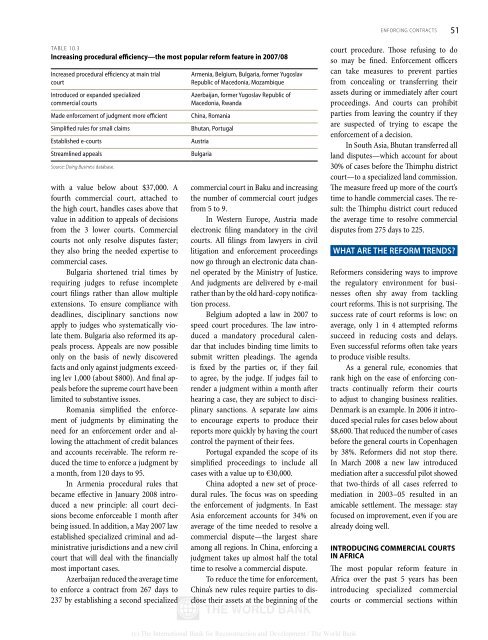DOING BUSINESS 2009 - JOHN J. HADDAD, Ph.D.
DOING BUSINESS 2009 - JOHN J. HADDAD, Ph.D.
DOING BUSINESS 2009 - JOHN J. HADDAD, Ph.D.
Create successful ePaper yourself
Turn your PDF publications into a flip-book with our unique Google optimized e-Paper software.
ENFORCING CONTRACTS 51Table 10.3Increasing procedural efficiency—the most popular reform feature in 2007/08Increased procedural efficiency at main trialcourtIntroduced or expanded specializedcommercial courtsMade enforcement of judgment more efficientSimplified rules for small claimsEstablished e-courtsStreamlined appealsSource: Doing Business database.with a value below about $37,000. Afourth commercial court, attached tothe high court, handles cases above thatvalue in addition to appeals of decisionsfrom the 3 lower courts. Commercialcourts not only resolve disputes faster;they also bring the needed expertise tocommercial cases.Bulgaria shortened trial times byrequiring judges to refuse incompletecourt filings rather than allow multipleextensions. To ensure compliance withdeadlines, disciplinary sanctions nowapply to judges who systematically violatethem. Bulgaria also reformed its appealsprocess. Appeals are now possibleonly on the basis of newly discoveredfacts and only against judgments exceedinglev 1,000 (about $800). And final appealsbefore the supreme court have beenlimited to substantive issues.Romania simplified the enforcementof judgments by eliminating theneed for an enforcement order and allowingthe attachment of credit balancesand accounts receivable. The reform reducedthe time to enforce a judgment bya month, from 120 days to 95.In Armenia procedural rules thatbecame effective in January 2008 introduceda new principle: all court decisionsbecome enforceable 1 month afterbeing issued. In addition, a May 2007 lawestablished specialized criminal and administrativejurisdictions and a new civilcourt that will deal with the financiallymost important cases.Azerbaijan reduced the average timeto enforce a contract from 267 days to237 by establishing a second specializedArmenia, Belgium, Bulgaria, former YugoslavRepublic of Macedonia, MozambiqueAzerbaijan, former Yugoslav Republic ofMacedonia, RwandaChina, RomaniaBhutan, PortugalAustriaBulgariacommercial court in Baku and increasingthe number of commercial court judgesfrom 5 to 9.In Western Europe, Austria madeelectronic filing mandatory in the civilcourts. All filings from lawyers in civillitigation and enforcement proceedingsnow go through an electronic data channeloperated by the Ministry of Justice.And judgments are delivered by e-mailrather than by the old hard-copy notificationprocess.Belgium adopted a law in 2007 tospeed court procedures. The law introduceda mandatory procedural calendarthat includes binding time limits tosubmit written pleadings. The agendais fixed by the parties or, if they failto agree, by the judge. If judges fail torender a judgment within a month afterhearing a case, they are subject to disciplinarysanctions. A separate law aimsto encourage experts to produce theirreports more quickly by having the courtcontrol the payment of their fees.Portugal expanded the scope of itssimplified proceedings to include allcases with a value up to €30,000.China adopted a new set of proceduralrules. The focus was on speedingthe enforcement of judgments. In EastAsia enforcement accounts for 34% onaverage of the time needed to resolve acommercial dispute—the largest shareamong all regions. In China, enforcing ajudgment takes up almost half the totaltime to resolve a commercial dispute.To reduce the time for enforcement,China’s new rules require parties to disclosetheir assets at the beginning of thecourt procedure. Those refusing to doso may be fined. Enforcement officerscan take measures to prevent partiesfrom concealing or transferring theirassets during or immediately after courtproceedings. And courts can prohibitparties from leaving the country if theyare suspected of trying to escape theenforcement of a decision.In South Asia, Bhutan transferred allland disputes—which account for about30% of cases before the Thimphu districtcourt—to a specialized land commission.The measure freed up more of the court’stime to handle commercial cases. The result:the Thimphu district court reducedthe average time to resolve commercialdisputes from 275 days to 225.What are the reform trends?Reformers considering ways to improvethe regulatory environment for businessesoften shy away from tacklingcourt reforms. This is not surprising. Thesuccess rate of court reforms is low: onaverage, only 1 in 4 attempted reformssucceed in reducing costs and delays.Even successful reforms often take yearsto produce visible results.As a general rule, economies thatrank high on the ease of enforcing contractscontinually reform their courtsto adjust to changing business realities.Denmark is an example. In 2006 it introducedspecial rules for cases below about$8,600. That reduced the number of casesbefore the general courts in Copenhagenby 38%. Reformers did not stop there.In March 2008 a new law introducedmediation after a successful pilot showedthat two-thirds of all cases referred tomediation in 2003–05 resulted in anamicable settlement. The message: stayfocused on improvement, even if you arealready doing well.Introducing commercial courtsin AfricaThe most popular reform feature inAfrica over the past 5 years has beenintroducing specialized commercialcourts or commercial sections within(c) The International Bank for Reconstruction and Development / The World Bank
















